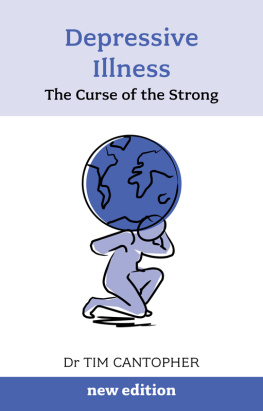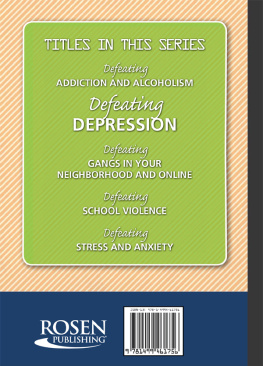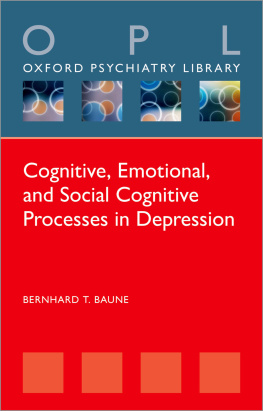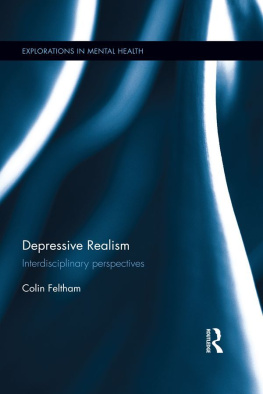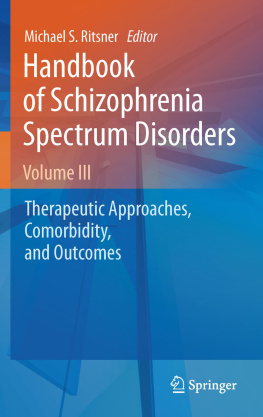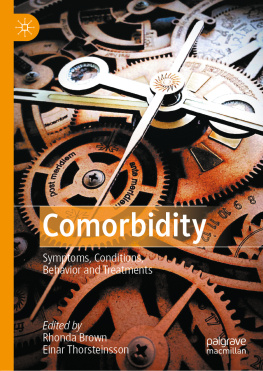The Oxford Handbook of Depression and Comorbidity
OXFORD LIBRARY OF PSYCHOLOGY
EDITOR-IN-CHIEF
Peter E. Nathan
AREA EDITORS:
Clinical Psychology
David H. Barlow
Cognitive Neuroscience
Kevin N. Ochsner and Stephen M. Kosslyn
Cognitive Psychology
Daniel Reisberg
Counseling Psychology
Elizabeth M. Altmaier and Jo-Ida C. Hansen
Developmental Psychology
Philip David Zelazo
Health Psychology
Howard S. Friedman
History of Psychology
David B. Baker
Methods and Measurement
Todd D. Little
Neuropsychology
Kenneth M. Adams
Organizational Psychology
Steve W. J. Kozlowski
Personality and Social Psychology
Kay Deaux and Mark Snyder

Oxford University Press is a department of the University of Oxford. It furthers the Universitys objective of excellence in research, scholarship, and education by publishing worldwide.
Oxford New York
Auckland Cape Town Dar es Salaam Hong Kong Karachi
Kuala Lumpur Madrid Melbourne Mexico City Nairobi
New Delhi Shanghai Taipei Toronto
With offices in
Argentina Austria Brazil Chile Czech Republic France Greece
Guatemala Hungary Italy Japan Poland Portugal Singapore
South Korea Switzerland Thailand Turkey Ukraine Vietnam
Oxford is a registered trademark of Oxford University Press in the UK and certain other countries.
Published in the United States of America by
Oxford University Press
198 Madison Avenue, New York, NY 10016
Oxford University Press 2014
All rights reserved. No part of this publication may be reproduced, stored in a retrieval system, or transmitted, in any form or by any means, without the prior permission in writing of Oxford University Press, or as expressly permitted by law, by license, or under terms agreed with the appropriate reproduction rights organization. Inquiries concerning reproduction outside the scope of the above should be sent to the Rights Department, Oxford University Press, at the address above.
You must not circulate this work in any other form
and you must impose this same condition on any acquirer.
A copy of this books Catalog-in-Publication Data is on file with the Library of Congress
ISBN 9780199797004
eISBN 9780199389612
SHORT CONTENTS
The Oxford Library of Psychology, a landmark series of handbooks, is published by Oxford University Press, one of the worlds oldest and most highly respected publishers, with a tradition of publishing significant books in psychology. The ambitious goal of the Oxford Library of Psychology is nothing less than to span a vibrant, wide-ranging field and, in so doing, to fill a clear market need.
Encompassing a comprehensive set of handbooks, organized hierarchically, the Library incorporates volumes at different levels, each designed to meet a distinct need. At one level are a set of handbooks designed broadly to survey the major subfields of psychology; at another are numerous handbooks that cover important current focal research and scholarly areas of psychology in depth and detail. Planned as a reflection of the dynamism of psychology, the Library will grow and expand as psychology itself develops, thereby highlighting significant new research that will affect the field. Adding to its accessibility and ease of use, the Library will be published in print and, later on, electronically.
The Library surveys psychologys principal subfields with a set of handbooks that capture the current status and future prospects of those major subdisciplines. This initial set includes handbooks of social and personality psychology, clinical psychology, counseling psychology, school psychology, educational psychology, industrial and organizational psychology, cognitive psychology, cognitive neuroscience, methods and measurements, history, neuropsychology, personality assessment, developmental psychology, and more. Each handbook undertakes to review one of psychologys major subdisciplines with breadth, comprehensiveness, and exemplary scholarship. In addition to these broadly conceived volumes, the Library also includes a large number of handbooks designed to explore in depth more specialized areas of scholarship and research, such as stress, health and coping, anxiety and related disorders, cognitive development, and child and adolescent assessment. In contrast to the broad coverage of the subfield handbooks, each of these latter volumes focuses on an especially productive, more highly focused line of scholarship and research. Whether at the broadest or most specific level, however, all of the Library handbooks offer synthetic coverage that reviews and evaluates the relevant past and present research and anticipates research in the future. Each handbook in the Library includes introductory and concluding chapters written by its editor to provide a roadmap to the handbooks table of contents and to offer informed anticipations of significant future developments in that field.
An undertaking of this scope calls for handbook editors and chapter authors who are established scholars in the areas about which they write. Many of the nations and worlds most productive and best-respected psychologists have agreed to edit Library handbooks or write authoritative chapters in their areas of expertise.
For whom has the Oxford Library of Psychology been written? Because of its breadth, depth, and accessibility, the Library serves a diverse audience, including graduate students in psychology and their faculty mentors as well as scholars, researchers, and practitioners in psychology and related fields. All will find in the Library the information they seek on the subfield or focal area of psychology in which they work or are interested.
Befitting its commitment to accessibility, each handbook includes a comprehensive index as well as extensive references to help guide research. And because the Library was designed from its inception as an online as well as a print resource, its structure and contents will be readily and rationally searchable online. Further, once the Library is released online, the handbooks will be regularly and thoroughly updated.
In summary, the Oxford Library of Psychology will grow organically to provide a thoroughly informed perspective on the field of psychology, one that reflects both psychologys dynamism and its increasing interdisciplinarity. Once published electronically, the Library is also destined to become a uniquely valuable interactive tool, with extended search and browsing capabilities. As you begin to consult this handbook, we sincerely hope you will share our enthusiasm for Oxford University Presss more than 500-year tradition of excellence, innovation, and quality, as exemplified by the Oxford Library of Psychology.
Peter E. Nathan
Editor-in-Chief
Oxford Library of Psychology
C. Steven Richards
C. Steven Richards is a professor of psychology and director of graduate studies at Texas Tech University. His primary research interests include depression, relapse prevention, comorbidity, self-control, and health psychology. He has held fourteen administrative positions during his career, at three different universities: Texas Tech University, Syracuse University, and the University of MissouriColumbia. He has over sixty publications, numerous convention presentations, andworking with his collaboratorshas attracted grant funding from state, regional, and federal agencies along with private foundations and societies.


